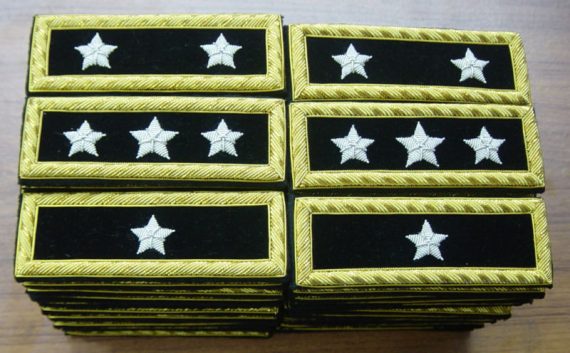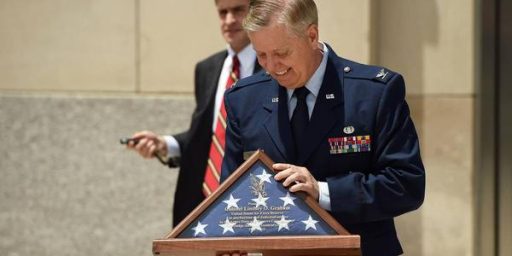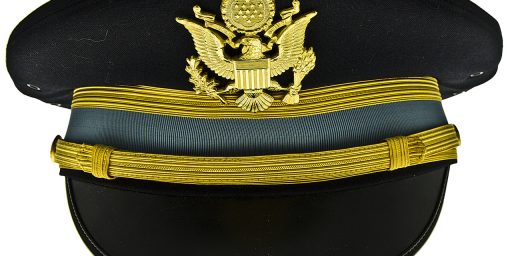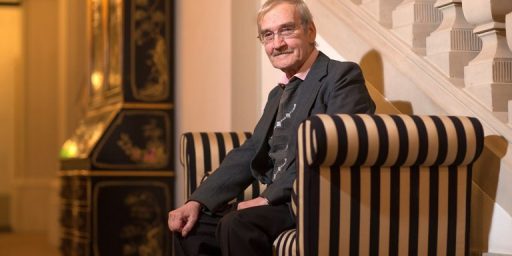Military’s Lock-Step Promotion System
The military promotion system does not reward top performers rapidly enough.
Peter Munson highlights a longstanding problem in the US military’s personnel system: “We Don’t Reward Top Performers – And It’s Costing Us.” Because of a “lock-step promotion metric,” relative mediocrities advance based on seniority and ticket-punching while the truly outstanding have to wait their turn. He contrasts this with private industry, where a CEO can spot a star and quickly advance him.
Anticipating the objection that experience is needed, Munson replies, “I have news for you: top performers with the right assignments can absorb very quickly what most don’t learn in 20 years.”
What’s odd about this is that the Defense Department itself accepts Munson’s argument–on the civilian side. The senior ranks of the Pentagon bureaucracy are filled with people who got Presidential Management Fellowships or into other internship programs, fast-tracked early in their career, and moved up the ladder expeditiously. PMFs are typically in their early- to mid-20s, just out of a strong master’s degree program, and start out as GS-13s*. While the pay now lags their uniformed counterparts considerably, a GS-13 is equivalent to a lieutenant colonel.
By contrast, take someone like John Nagl, who recently stepped down as president of the Center for a New American Security to take an endowed professorship at the Naval Academy. He graduated near the top of the West Point Class of 1988 and went to Oxford on a Rhodes Scholarship. He excelled as a tank officer, seeing combat duty in Desert Storm and again in Iraqi Freedom. Along the way, he picked up his doctorate at Oxford, where he wrote a seminal book on counterinsurgency, and was the lead author of the Army-Marine Corps field manual for COIN. He retired from the Army after 20 years as a lieutenant colonel. That is, at the same level of responsibility of a snot nosed PMF right out of grad school.
The military promotion system, especially on the officer side, is based on seniority and successfully clearing a series of hoops. For an Army officer in the combat arms branches, it looks something like this: Get commissioned. Attend Basic Course. Lead a platoon and run a motor pool. Attend Advance Course. Command a company and do junior staff time. Attend Command and General Staff College. Get master’s degree, even if from degree mill. Serve as battalion XO and do brigade staff time. Punch Joint ticket. Command battalion. Attend War College. Command brigade. (This is slightly fuzzy, as there are variations on the pattern.)
The very top officers can get ahead of their year group ever so slightly. There’s an opportunity to get selected for major one year early. Ditto lieutenant colonel. Still, we’re talking about 15 years of outstanding service to get to the same level of responsibility as that wet behind the ears PMF.
Really, for uniformed officers, the career pattern doesn’t loosen up in the way it is for their business suit-wearing colleagues until after making bird colonel–usually around age 44 or 45. After that, promotion through the general officer ranks can occur quite quickly without regard to relative time in service. See, for example, Colin Powell or Al Haig. But until then, it’s hurry up and wait.
Despite my jocular use of “snot nosed” and “wet behind the ears” to refer to the PMFs, I’d argue their system makes far more sense. Outstanding talent is identified early and they’re groomed for success. Those who excel continue to move up the ranks rapidly, constantly exposed to new challenges and being allowed maximum use of their abilities. Further, they’re allowed to move up by being good at what it is they do, rather than punished for being great staff officers but mediocre commanders or vice versa.
Of course, the easy rebuttal to all this is that, despite the obvious absurdity of the system, we’re doing a fine job of grooming colonels and generals. While we may well do a better job of retaining the John Nagls of the world if they were moved up more quickly, it’s not as if we’ve got a bunch of mediocrities running around with stars on their shoulder boards. But I suspect we’d have better field grade officers if we didn’t run off many of the best and brightest captains by making them wait their turn.
_________
*A commenter points out that my recollection is slightly faulty: PMF’s don’t begin as GS-13s but rather as GS-9/11/12s. But they’re eligible for promotion through GS-13 during their two year fellowship.






Re-read Yingling’s piece on the failure of Generalship. Recall how long it took McMaster to get promoted, and the doubts it would happen. Think back on the troubles getting people to work on training Iraqi and Afghanistan troops (it took them out of the promotion sequence). Yes, we have a problem, and I think it has left us with an officer corps that in the senior ranks is not as good as it should be. Too much groupthink. (As an aside, I always thought it was weird that they placed so much emphasis on your official picture. Performance, performance, performance.)
Steve
A lieutenant colonel is much more comparable to a GS-14 and a full colonel is comparable to a GS-15.
The difference is that very few of the Presidential fellows stick around in the civil service for twenty years but are actually on the track on being political appointees.
The group of fellows is very small and the group of second lieutenants is very large and are not capable. The plan to speed up promotions for the elite officers (read DC officers) and leave the officer who actually have to worry about motor pools and live in Killeen Texas on a slower track.
The real question would be is what would happen to the military when most of the senior leadership spends their entire career in DC, Tampa, Honolulu, or Belgium?
James,
It’s not just the Army either – all the services are like this and it’s because we have this legacy personnel system from the late 1940’s that’s not relevant and no serving the the nation’s interest. I don’t see how this can change without substantial reform from Congress which doesn’t appear at all likely at this point.
The British call it Buggin’s turn. The seniority system has been the bane of military organisations since they first came into existence in the late 17th century. It’s been the underlying theme of several novels, plays and movies I can think of. And yes it’s tends to elevate mediocrity. I’ve known several half and full colonels of quite astonishing stupidity who grimbled to their ranks through 30-40 year careers mainly focussed on keeping their noses clean. The good news is that any of our likely opponents with formal militaries labors under the same handicap (although not insurgents of course). Given his resume the Nagl case suggests he didn’t keep his nose sufficiently clean.
James,
I agree with your comments up to a point.
My disagreement stems from the fear of the military’s Good Old Boy Network (GOBN). I can easily see them using an expedited system to fast track their favorites regardless of qualifications. We could end up with a military service structured along the lines of the European military services of the middle ages; promotion based upon “blood” rather than ability.
To be honest I’m more worried about our officer class slow transformation (post draft) into an insular and reactionarily conservative force. They’ve institutionalized going behind the service chiefs backs when it comes to their budgets and some have brought the culture wars into the barracks both in words and deeds. These are things which will be very difficult to stamp out in the future.
I see those as larger problems for our military than the possibility that they may miss out on the next Gen.Eisenhower due to a slow promotional system.
@Loviatar:
Actually Ike is a classic example of the molasses like nature of the seniority system. He was still a colonel until late 1941 when he got his first star. His good fortune arose from the fact he along with others was talent spotted by Marshall who’d also been a victim of the system until he was talent spotted by FDR who made him CoS despite his relative lack of seniority.
You really think this never happens in private industry? Particularly once a company is larger than one or two hundred people?
Serious question: What’s the evidence for this? Another way of asking: how would we know if we weren’t?
@Stormy Dragon:
Have to agree with you although I’d say the critical figure is somewhat higher maybe around 3000 employees. In business units under this size the CEO particularly if it’s a family company is pretty hands on right down the line but big corporations are much more bureacratic and it’s far harder to move up quickly unless you’re on a fastrack. It’s certainly more flexible than the military but not by the quantum amount that JJ suggests.
@Brummagem Joe: Nagl wasn’t booted out; he retired at 20 and immediately moved to a less stressful, higher paying, more influential position. At a time when he would have just been pinning on colonel’s eagles–and fetching coffee for generals at the Pentagon–he was instead serving on presidential advisory boards.
@Stormy Dragon: I’m sure private industry can be very bureaucratic. But it’s also pretty routine to see VPs who are quite young.
@Jim Henley: A good question, really. Most of the colonels and GOs I encounter–granted, from the perspective of a DC think tank, so perhaps quite skewed–strike me as intelligent and competent.
@Stormy Dragon: Agreed. It is particularly egregious when dealing with techs and engineers. “Oh, you’re an excellent engineer – obviously you have the people skills and budgeting savvy to make a great manager! What? You don’t want to have to manage a team? You would rather keep working on your projects? Nonsense! Congrats on the promotion!”
This is just wrong. From the OPM website:
PMF’s are hired with the “Promotion Potential” to GS-13. The grade that PMF’s are initially hired at depends on the years of experience they have prior to appointment, which in my experience is usually GS-9 or GS-11. And the system of promotion is based entirely on the seniority system that this blog post decries, based solely on satisfactory performance and on an annual basis from 9 to 11 to 12 to 13. Therefore, it is highly common to see former PMF’s reach GS-13 and rather quickly, however the basic thrust of the argument being made here is just wrong. And it is important to note, that once someone reaches the top grade of their Promotion Potential, it is necessary to get an Accretion of Duties to move from GS-13 to GS-14 and I believe after that GS-15 positions must be competed. So after that, high performers are basically looking at a career of annual automatic step increases, with perhaps two more promotions in grade for the rest of their lives.
I think it would have behooved the author to know a little bit more about the Federal civil service system and the PMF program prior to posting this.
@Jim Henley:
Sir Michael Howard the British military historian and analyst perhaps provided the answer when he was comparing the relative merits of the generals of the Western allies in WW 2 with those of Germany and Russia. He observed that much of military routine in Britain and the US revolved around managing armies and that they produced some notably good military managers but not such good fighters. Of course there are other factors (like tolerance of casualties) but it’s always struck me as a very perceptive comment. I think this is one of the problems that’s bedevilled the US army since WW 2 when overall our performance has not been that distinguished by any measure. This is much less so of the airforce and navy where technology plays a bigger role. The debacles in Afghanistan and particularly Iraq should be causing a lot of soul searching but I suspect they are not.
@James Joyner:
I know he wasn’ booted out. I was just observing that his promotion prospects may have been injured by a too obvious intelligence and independance of mind.
@James Joyner:
Oh certainly there are people who happen to catch the CEO’s notice and he takes a personal interest in their career. But at a large company this is the exception, and while the young VP certainly is talented, there’s probably several other equally talented people who never had the opportunity to catch the CEO’s attention.
What I’m objecting to is your implication that private companies generally have systemic procedures that identify all talent and fasttrack them. In reality, most people advance based on seniority just like the army and the exceptions are a result of serendipidty rather than design.
@Stormy Dragon: Having worked for several multi-national corporations this is exactly what happens. The higher you get the more important it is to be a politician. No matter what your skills if you don’t have political skills you won’t advance. This is not always a bad thing. Eisenhower’s success at D-Day was part tactical and part political and the political was probably more important.
@Ron Beasley: Aside from promoting technicians to jobs where they’ll still be technicians, I’m not sure that’s such a bad thing. Even though I’m decidedly not all that adept at the social politics of institutions, I recognize that being good at it is crucial in key leadership positions. Socially awkward nerds and curmudgeonly assholes are good at getting work done but not at getting others to get their work done and achieve institutional goals.
@superdestroyer: A lieutenant colonel is much more comparable to a GS-14 and a full colonel is comparable to a GS-15.
Since there are more GS grades than O grades, the comparison isn’t perfect. But the protocol has a GS-12 as equivalent to a major (O-4), GS-13 and GS-14 as equivalent to a lieutenant colonel (O-5), and a GS-15 as equivalent to a colonel (O-6). In practice, the protocols aren’t always observed or seemingly even understood. I’ve seen GS-15s working for LTCs, which just shouldn’t happen.
Is the actual rank/grade the only way the Army indicates your value? Does the Army make any effort to mollify this by putting the more talented folks in the more important positions of a certain grade? That is, does which staff you are assigned to, which general you are aide to, which battalion or brigade you are XO and then commander, etc. indicate whether you are valued and a “comer” or are just being shuffled along due to the lockstep seniority system, or is it just random? Similarly, are there non-standard assignments – like Nagl’s writing the COIN field manual – that give you non-rank weight and influence?
This is quite common in industry – at my old company there were 11 of us with “product manager” titles and all in the same pay range, bonus pool, and so on, but 2-3 were clearly first among equal due to the importance of the projects we managed, which VP we reported to, which then translated into impact and import far beyond the rest of the group.
@James Joyner: @James Joyner: I agree, politics is an important aspect of leadership at higher levels. I think that is the point I was trying to make with Eisenhower. It becomes a problem when the only thing the individual has is political skills. I don’t know about the military but that does happen in business.
@Ron Beasley:
Well that was pretty well Eisenhower’s principal skill set. He didn’t have very strong strategical skills and I very much doubt he could have managed a divisional retreat. He was a diplomat general/chairman of the board….and a damned good one. In his entire previous career he never saw action and didn’t do much other than act as MacArthur’s CoS. He went from colonel to four star in under four years and never conducted a battle. This is ancient history but what concerns me is you have people like that dunce who oversaw the Iraq invasion…how the hell did he get there?
The alternate system to seniority that Mr. Munson is lauding is the basic 19th century patronage system – there is a reason why it was historically moved away from : it occassionally produced some brilliant Generals, but it more often produced spectacular failures.
As for the private industry fast tracking brilliant executives – total romantic bs. He has been watching too many 80s comedies about the stockboy becoming an executive vp and performing brillianting (because he “gets” it or he is “real”). Every major company has a promotion procedure in place to make certain each person gets tried and tested before they get more responsibility – the military may be a bit more conservative, but then the stakes are higher for them.
@c.red:
Everyone whose ever attended a managemt training course must have come across that matrix that was allegedly developed by the Great German General Staff.
Across horizontal axis…Stupid….Intelligent….Very intelligent
Up vertical axis….Lazy….Industrious…..Very industrious
The very intelligent and very industrious went to the staff…the lazy and stupid to the infantry….the lazy and very intelligent became generals….the very stupid and very industrious were cashiered.
A modest proposal – create ‘fast track’ senior officer promotion opportunities but also mandate that all officers do a minimum of 4 years enlisted (starting at E-3 with normal (current) promotion opportunities) before they can commissioned.